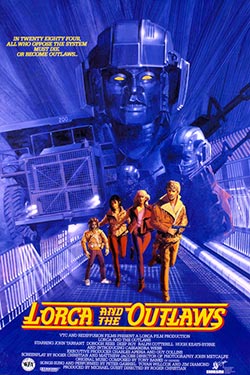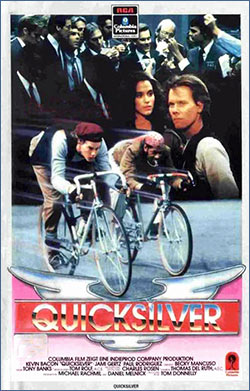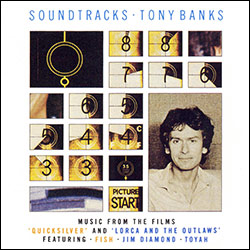- Article
- Read in 10 minutes
Tony Banks – Soundtracks – CD review
At the beginning of his solo career, Tony Banks also repeatedly contributed music for films. In the mid-80s, he summarised these on an album that he simply called Soundtracks. Tommy Ender gets to the bottom of it …
Soundtracks is more of a collection of film scores for Lorca and the Outlaws a.k.a. Starship and Quicksilver than a proper solo album like The Fugitive. It’s a compilation. Of course, alongside the instrumental film music, there are also a few sung songs on the album, but primarily it was about putting both soundtracks on one album.
After Tony’s second solo album The Fugitive was released in 1983, along with the self-titled Genesis album, Banks worked on some other film scores. His first foray into the film music business was already in 1978 with the film The Shout, for which Banks composed the score together with his bandmate Mike Rutherford. In 1983, he then wrote the film score for The Wicked Lady.
His first assignment after 1983 was working on the film score for 2010 – The Year We Make Contact. Unfortunately, all of his proposals were rejected, so the assignment went to David Shire. It’s also good to know that Banks was a candidate for the film score of Terminator, starring Arnold Schwarzenegger. In 1984, he then wrote the soundtrack for a low-budget science fiction production titled Starship/Lorca and the Outlaws (in German, the film was called Redwing – Escape from the Black Droids). However, the film had such a small budget that Tony agreed to work for free. Unfortunately, success eluded it, partly because the plot was considered rather meager. He also wrote the soundtrack for the film Quicksilver in 1985 – a film about the relationship between large corporations and the underworld – starring Kevin Bacon.

This film was also not very successful and was heavily criticized at the time. Bacon later said about it: “It was the absolute low point of my career”. Unfortunately, both films for which Tony Banks wrote the soundtrack were unsuccessful. The original motion picture soundtrack of Quicksilver featured, besides Tony Banks, other big names like The Who founder Roger Daltrey and Peter Frampton. The official soundtrack was available for purchase as an LP in 1986. The film music for Starship/Lorca and the Outlaws was even released in 1985 on an E.P. and 12″ maxi. Both film scores then ended up on his next album. Soundtracks – which was released in 1986 – was produced by Tony Banks himself, with help from Andy Jackson (Shortcut to Somewhere) and Chas Watkins (You Call This Victory and Lion of Symmetry).
Despite all the negative criticism beforehand, I would still like to examine this album a bit more closely (musically). Tracks 1-3 are from the film Quicksilver, the remaining tracks belong to the film Starship.
1. Shortcut To Somewhere (3:38)
In the mid-80s, collaboration began with the former singer of the Neo-ProgRock band Marillion, Fish aka Derek William Dick. Together they wrote the hit single Shortcut to Somewhere. Tony on the creation process: “When we wrote the song Shortcut to Somewhere, he drank a whole crate of John Smith’s beer. Great fun, nice guy.” Based on the main motif of the Quicksilver Suite, both delivered a rather clunky than fluid pop song. The brass sounds are somewhat reminiscent of Banks’ famous bandmate, but unlike him, Tony uses sampled sounds. Characteristic of this song is also the typical Fish spoken-word singing, which only really works with Fish. This can also be heard well on recordings of the Atlantic Record’s 40th Anniversary concert, where Phil Collins visibly struggles through the song. Overall, this song is rather mediocre, as Banks has certainly written better pop songs. There are also two funny music videos for Shortcut to Somewhere, one version of which can be found on the DVD Kettle Of Fish.
2. Smilin’ Jack Casey (3:14)
After a brief excursion into the world of pop music, a purely instrumental piece follows. Jack Casey is the central role in the film Quicksilver, played by Kevin Bacon. He is a stock trader. After a bad day at the market when things didn’t go well for him, he made a risky decision that backfired. As a result, he lost all his professional and family savings. In the film, these scenes are represented by this instrumental piece Smilin’ Jack Casey. It is clearly rooted in the sound of the 1980s. This can also be heard in the synthetic guitar sounds, which Banks later also used on Bankstatement. At the end, there’s a fine keyboard solo before the song ends. The piece of music certainly corresponds well with the scenes depicted in the film and as such doesn’t seem disturbing, but rather a bit inconspicuous.
3. Quicksilver Suite: Rebirth/Gypsy/Final Chase (9:22)

The Quicksilver Suite consists of three parts:
1. Rebirth 3:00
2. Gypsy 3:43
3. Final Chase 2:49
It begins with Rebirth, which is also the main theme of the Quicksilver Suite. It’s something like the instrumental version of Shortcut to Somewhere. The beginning is somewhat reminiscent of the transition from In the Glow of the Night to The Last Domino. Of course, as with Shortcut to Somewhere, the synthetic brass sounds predominate, but this part seems a bit naked without vocals. After our main character Jack Casey has lost all his money and his family’s money, he quits his job and starts anew as a bicycle courier at Kurtzweill’s Quicksilver Express. His initial dejection, disillusionment, and the discovery of a bicycle in a second-hand shop are underscored by Rebirth. The second part, The Gypsy, is characterized by dark and dangerous-sounding keyboard sounds that swirl around you. Gypsy is, so to speak, the antagonist of the film, and whenever he appears, an excerpt of this melody is played. In the last part of the suite, Final Chase, the theme of the Quicksilver Suite is revisited in a slightly altered version. As the name suggests, this piece of music underscores the final scene. Towards the end, the music builds to its climax and corresponds excellently with the scenes shown in the film: The chase between Gypsy and Jack, in which Gypsy ultimately dies. One must always evaluate the film music with the scenes shown in the film. Although the music is certainly not outstanding, one must nevertheless say that some moments in the film were quite appropriately underscored by the aforementioned instrumentals. The Quicksilver Suite and Smilin’ Jack Casey are unique and pieces of music that could only have been created in the 1980s.
4. You Call This Victory
You Call This Victory was created together with Jim Diamond, who also sings this song. It’s a rather insignificant pop song. As is typical for Banks, one is again inundated with keyboard sounds, guitars are as always underrepresented, and even the rhythm section is rather boring. In the long run, the song is too harmless, nothing special happens, the singing starts to annoy after a while, and the song as such is much too clunky to function as a pop song. If you don’t know this song, you haven’t really missed anything. That Tony Banks has managed far better pop songs is shown by songs like Throwback (found on Bankstatement) or Red Day on Blue Street (Still). You Call This Victory, however, unfortunately remains at a low level and fails to impress the listener in any way.
5. Lion Of Symmetry (7:22)
This time it’s a collaboration with Toyah Wilcox, the wife of King Crimson founder Robert Fripp. The lyrics were written by Toyah, Banks wrote the music. Lion Of Symmetry is one of the more interesting songs on the album. It’s more similar to the pop-prog that Genesis celebrated on Invisible Touch in songs like Domino or the B-side Feeding the Fire. Unlike most of the rest of the album, there’s more variety here and it’s simply fun to be caught up in the dark atmosphere. Tony said about it: “There was also supposed to be a song with Toyah Wilcox on it,… called Lion of Symmetry. Toyah had a great voice but always sang simpler things, so I gave her a challenge […] I find this song very moving.” Of course, synthesizers predominate here again, but unlike e.g. Shortcut to Somewhere, the synth sounds fit excellently here and don’t disturb at all. Lyrics and music are dark, if not threatening, and characterized by powerful bass sounds. Towards the end, the song really blossoms and Toyah delivers with her expressive voice that certain something to the song. For me, Lion Of Symmetry is one of the best songs on the album.
6. Redwing Suite (16:10)
The Redwing Suite is then the actual film score for Starship/Redwing – Escape from the Black Droids and consists of 5 parts:
1. Redwing 5:44
2. Lorca 3:55
3. Kid and Detective Droid 2:11
4. Lift Off 3:10
5. Death Of Abby 1:42
To briefly describe the film: The plot is set in the year 2084 on the mining planet Odessa. According to the plans of the dictator Jowitt, the people working there are to be replaced by robots. Lorca and Kid, an android, oppose the dictator. In various confrontations, some quite brutal, it comes to the decisive power struggle between Jowitt and Lorca. But now to the actual film music: It begins with Redwing rather restrained with some keyboard sounds that are reminiscent of something like Mama and the transition from Home by the Sea to Second Home by the Sea.
However, it remains with these droning sounds. One can certainly recognize Tony’s love for classical/orchestral works in Redwing, it even builds up to a small climax, but this gets lost in the sound mush of the keyboards. An implementation by an orchestra would certainly be exciting and would have sounded better back then. What sounds quite nice at first becomes uninteresting and harmless the second time around. After five and a half minutes, the next part of the suite follows: Lorca. The piece was named after the main character in the film: The young Lorca. Connoisseurs will certainly find it familiar. On Bankstatement, Lorca eventually became the song Queen of Darkness. Here it’s a purely instrumental song that sounds quite plastic.
One could describe Lorca as a rough version for Queen of Darkness and the song really works in a much more powerful version on Bankstatement. Although Lorca itself doesn’t come across very convincingly, it’s probably the most exciting thing the Starship film score has to offer. The following part is called Kid and Detective Droid, in which the Redwing motif is picked up again. Lift Off is characterized by eerie synth sounds, coupled with a few organ sounds. In the long run, this becomes too boring and the constant repetition of the same melody gets on your nerves towards the end. Then follows the last part of the suite: Death of Abby – and here it gets a bit dramatic. This is underlined by some tragic string sounds and organ sounds.

The Redwing Suite offers some interesting moments and I would certainly be interested in listening to this suite with a new instrumentation by a proper orchestra. Redwing begins really interestingly and builds up to a small climax. Unfortunately, other parts of the suite are rather insignificant, even boring, so that one sometimes feels compelled to ‘skip’. The conclusion is mixed. Besides one good song, there are too many insignificant to even bad pieces of music. The highlight is undoubtedly Lion of Symmetry, but unfortunately, there are no comparably good songs on the album.
Shortcut to Somewhere is not bad despite the mentioned shortcomings, but due to its clunky structure, it’s not very radio-friendly. The film music for Quicksilver doesn’t hurt, it certainly fits the scenes shown, but is perhaps a bit insignificant. The “Redwing Suite” hints at Tony’s preference for classical music in some places, but remains at one level due to the one-sided instrumentation. Some things are simply inadequate, this applies especially to You Call This Victory and also some sections of the Redwing Suite. Songs like Shortcut to Somewhere or You Call This Victory are characterized by a recurring structure and lack of dynamics.
There’s simply a lack of variety, drama, interesting turns, and melodies. The sounds are of course characterized by the 80s, but for that, they are partly oppressive and plastic. Even the drum sounds are far too boring. Even the single releases were not successful. It’s the same old problem that recurred with The Fugitive and later also with the albums Bankstatement to Strictly Inc.: Tony’s attempts to create catchy pop songs fail because they are far too boring and clunky. Only the song Lion of Symmetry, written with Toyah Wilcox, goes in the direction of prog-rock or “PopProg” as found on Invisible Touch. One would have liked to have one or two more exciting titles instead of You Call This Victory. The fact that both films were not very successful adds a bitter aftertaste to the whole thing. What a pity!
Author: Tommy Ender
Sources:
(1) Tony Banks – official website:, abgerufen am 11.07.2014.
(2) Tony Banks, Phil Collins, Peter Gabriel, Steve Hackett, Mike Rutherford: Genesis. Chapter and Verse (Weidenfeld and Nicholson), 2007, Seite 269
(3) Discogs.com: Tony Banks: Soundtracks., abgerufen am 11.07.2014.
(4) Deutscher Genesis Fanclub it: Track of the Week: Shortcut to Somewhere., abgerufen am 11.07.2014.
(5) Deutscher Genesis Fanclub it: Song der Woche: You Call This Victory., abgerufen am 11.07.2014.
(6) Deutscher Genesis Fanclub it: Tony Banks, Biografie. , abgerufen am 23.07.2014
(7) Wikipedia, the free Encyclopedia: Tony Banks., abgerufen am 11.07.2014.
(8) Wikipedia, die freie Enzyklopädie: Redwing – Flucht vor den schwarzen Droiden., abgerufen am 24.08.2014
(9) Internet Movie Database: Redwing – Flucht vor dem schwarzen Droiden., abgerufen am 24.08.2014.
(10) Discogs.com: Tony Banks / Jim Diamond / Toyah – Perform Songs From Lorca And The Outlaws., abgerufen am 24.08.2014.
(11) Discogs.com: Quicksilver Original Motion Picture Soundtrack., zuletzt abgerufen am 15.10.2014.
(12) FORUM des Deutschen Genesis Fanclubs it: Tony Banks – Soundtracks – Eure Meinungen?, zuletzt abgerufen am 15.10.2014.

